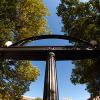UGA Holds Memorial for Baldwin Hall Remains

Photo Credit: Joshua L. Jones
Federal Judge Steve Jones, an Athens native and UGA graduate, speaks at the memorial service for dozens of people whose remains were moved from the Baldwin Hall construction site to Oconee Hill Cemetery.
The University of Georgia held a memorial service today for 105 people whose gravesites were found during construction on a Baldwin Hall expansion project and moved to nearby Oconee Hill Cemetery.
"From the moment the first remains were discovered in November of 2015, the university's guiding principle has been to treat these individuals with dignity and respect, and it is in that spirit that today's ceremony was developed," UGA President Jere Morehead said.
Most of the 30 remains that could be tested were of African ancestry—presumably slaves, given that the Jackson Street or Old Athens Cemetery where they were found closed in 1856—and some members of Athens' African-American community have been critical of the way UGA has handled the situation, given that the remains probably belong to ancestors of living Athens residents.
Linda Davis, a Clarke County Board of Education member who is leading efforts to restore the historic black Brooklyn Cemetery, has suggested the remains should have been reinterred there or at Gospel Pilgrim Cemetery, another black cemetery, instead of Oconee Hill, which was historically segregated.
One anthropologist, Michael Trinkley of the Chicora Foundation, told National Public Radio that the remains should not have been moved at all.
"The fact that these individuals are 50 years, 100 years, 200 years old to many does not reduce the trauma of the event of removal," Trinkley said.
UGA has said it acted on the advice of the state archaeologist's office, which said to reinter the remains in the closest cemetery to the site they were found in, and in the same arrangement they were found in. The Baldwin Hall site had 105 gravesites, but only 63 remains were found, indicating some had been moved previously.
Boxes containing the remains were quietly reinterred last week, and granite monument installed over them. An inscription on the monument reads:
Here lie the remains of 105 unknown individuals, originally interred during the 19th century. The vast majority of the 30 remains able to be identified were those of men, women and children of African descent, presumably slaves or former slaves. Others were of European and Asian descent. Their remains were discovered in November 2015 during the University of Georgia's Baldwin Hall construction project adjacent to the Old Athens Cemetery. In March 2017, they were respectfully reinterred here.
May they continue to rest in peace.
"Despite all that we do not know, it is our privilege to join together today—in complete reverence—to pay tribute to these individuals as they assume their final resting place in the historic Oconee Hill Cemetery," Judge Steve Jones said during the ceremony. "While we cannot call to mind their personal stories or life histories, we can hold these individuals with care and compassion in our hearts and in our minds."
UGA anthropology professor Laurie Rietsma oversaw the exhuming and study of the remains. Today, the university announced a second round of research, headed by Vice President for Research David Lee, "to understand better how these 105 individuals lived as well as their connections to the Athens community, including any ties to slavery."
Morehead also said he will step up efforts to cooperate with the Athens community on issues like education and economic development.












comments